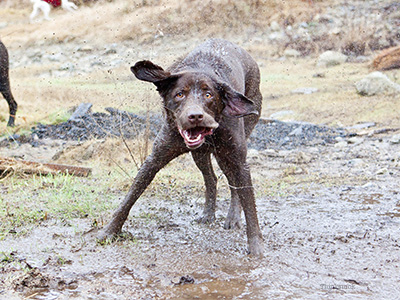
My dog goes everywhere with me—from rides in the car, to sleeping in my bed (Yes, he sleeps under the sheets), to lying on the sofa with me. And while I don’t mind the occasional dog hair, I like to consider myself a neat freak. So if my dog starts to stink, he gets the boot, a bath, and a veterinary examination.
If you’re not letting your dog sleep on the bed with you, ask yourself why. Is it because he stinks?
While we as veterinarians don’t get asked this question very often, we should let you know that there is often an underlying medical problem if your dog stinks. (Of course, we smell pets all day long and don’t want to offend you by asking if you are noticing this malodorous stink!).
What are the medical causes of a smelly dog?
Dogs may smell due to underlying skin oils that accumulate in their fur, typically these oils need to be washed every few months (depending on how fast the oil accumulates, how much your dog swims, how long the hair is, etc.). If you find yourself noticing a smell more frequently, note that there may be an underlying medical cause for the stink including:
- Otitis
- Dental disease
- Allergies
- Metabolic disease causing ulcers in the mouth
- Poisons causing ulcers in the mouth
- Cancer
- Excessive seborrhea
Otitis causing dogs to smell
Ear infections can be due to yeast or bacteria, and often may be due to the breed confirmation of the ear (e.g., long floppy ears like Cocker spaniels), or due to underlying food allergies or atopy (e.g., hay fever). If your dog has chronic ear infections, check with your veterinarian for an underlying cause!
Dental disease causing dogs to smell
If you’re not brushing your dog’s teeth at least once a week, please do. That’s because tartar can harden into rock hard plaque, resulting in inflammation to the gums and secondary infection. This can cause severe halitosis (i.e., bad breath).
Allergies causing dogs to smell
As previously mentioned, certain types of allergies (like food allergies or inhaled allergies) can result in itching, excessive grooming, and secondary skin infections which can cause a foul, yeasty smell of your dog’s skin.
Metabolic disease causing dogs to smell
Underlying metabolic problems like kidney failure or rarely, liver failure, can result in ulcers developing in the mouth. This can cause drooling, not eating, and severe halitosis. Also, certain endocrine diseases like diabetes mellitus can result in complications when untreated leading to fat breakdown (diabetes ketoacidosis) and an unusual sweet “acetone” smell to your pet’s breath.
Poisons and burns causing dogs to smell
Certain poisons such as corrosive or caustic substances, or biting into an electrical cord - can cause severe burns or ulcers of the mouth. This can also cause drooling, not eating and severe halitosis.
Cancer causing dogs to smell
Cancer anywhere in the body can become infected and ulcerated, resulting in a necrotic smell. This can occur in the mouth, in the ears, in the skin or anywhere. When in doubt, if you notice any lumps or bumps, seek immediate veterinary attention!
Excessive seborrhea causing dogs to smell
Certain breeds such as miniature Schnauzers are more predisposed to excessively oily skin, resulting in a unique smell and greasy feel when touched. This can be treated with certain shampoos and topical medications.
When in doubt, if you notice that your dog is starting to smell, start with a bath. But if it’s persistent, talk to your veterinarian about this unusual – potentially medical – stink!
If you have any questions or concerns, you should always visit or call your veterinarian -- they are your best resource to ensure the health and well-being of your pets.
